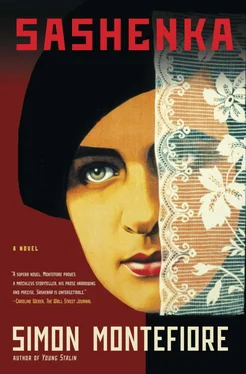Lala took Roza’s hands, not only squeezing them with all her might but shaking them too. Neither woman said a word, but from where she was standing Katinka could see Roza’s shoulders shaking, and the tears streaming down Lala’s cheeks. Feeling like an intruder suddenly, she walked to the window and looked out. The sounds and smells of Tbilisi—the singing of someone in the street and the aromas of tkemali, lavashi bread, ground coffee and apple blossom—rose around her.
This is the last scene of the drama, Katinka told herself. She’d done what Pasha asked. She’d brought these two women together, exposing herself in the process to more pain than she’d thought possible. Now she would go home, back to Papa and Mama—and to Andrei.
Lala stroked Roza’s face. “Dear child, I dreamed of seeing your mother again. I must tell you all about her because there was no one like her. Look, there’s her picture as a schoolgirl at the Smolny. See? I used to collect her in the baron’s landaulet, or motorcar I should say nowadays. Samuil, the baron, was your grandfather and you never met him though he knew all about you. And not a day passed when I didn’t think of you and your brother Carlo. As a girl you were so like your mother—she was blond as an angel when she was young—and you have the violet eyes of your grandmother, Ariadna. Oh darling child, think of me, a girl from England. I’ve lived long enough to see the Tsar fall and the barbarians come to power and fall too and now to see you here—I can’t quite believe it.”
“I’m hardly a child,” Roza laughed, “I’m sixty.”
“Methuselah’s young to me!” Lala answered. “Do you remember the days we spent together before…”
Roza nodded. “I think so…Yes, I remember seeing you in a canteen in a station. You had Carlo’s favorite cookies. I remember walking hand in hand with you and then…”
“I struggled in those times to keep my head above water,” Lala continued. “I had lost my darling charge, Sashenka, and your grandfather. And then I was granted a few days of such happiness with you and Carlo. When I had settled you with your new parents, I considered killing myself. Only the thought that someone dear to me would return kept me alive. And do you know, the most unlikely person of all did come back.”
“Lala,” interrupted Katinka, trying not to interfere yet still burning with curiosity, “only Stalin could have saved Samuil’s life. Did you ever learn why?”
Lala nodded. “After the monster died, everyone here sobbed and mourned. There were even demonstrations in his honor. But I was delighted. Samuil was very ill then so I said, ‘Now you can tell me why you were released.’ He said he didn’t know exactly but in 1907 he had given shelter—and a hundred rubles—to a pockmarked Georgian revolutionary. He let him stay in the doorman’s cottage of his house here in Tbilisi when the police were searching for him. Later he realized it was Stalin, and Stalin never forgot a slight or a favor.” Lala looked back at Roza, whose hands she still held. Sometimes she raised Roza’s hands to her lips and kissed them. “I’ll die happy now,” she said.
“You’re my only connection to my mother,” said Roza. “You know, I almost hated my parents all through my childhood. They’d abandoned me and I never knew why. I couldn’t imagine what I had done wrong for them to reject me. Yet I thought of them all the time. Sometimes I dreamed they were dead; often I looked at the Bear in the sky because Papa had told me that he would always be there. Only when I was older did I realize that perhaps something bad had happened to them and they had had no choice but to leave me. But all through my life I’ve never been able to cry about them.”
Roza turned to Katinka. “You’ve done so well, my dear. Thank you from the bottom of my heart—thank you. You’ve changed my life. But I know you’re keen to get home and Pasha’s plane’s waiting at the airport to fly you to Vladikavkaz. Please go whenever you want to.”
Katinka kissed Roza and Lala and walked to the door—then stopped.
“I can’t go quite yet,” she said, turning back. “May I stay and listen? I’m afraid I’ve become more involved than I should have.”
Roza jumped up and hugged her. “Of course, I’m so pleased you feel like that. I’ve become very fond of you.” She sat on the bed again. “Lala, thanks to Katinka, I know about you and my parents. But please, tell me about Carlo.”
Lala took a sip of her wine and closed her eyes. “He was the sweetest child, built just like a little bear with adorable brown eyes, and he was such a child of love, so affectionate. He used to stroke my face with his hands and kiss me on the nose. The day I had to let him go was one of the cruelest of my life. We were at the Beria Orphanage—can you imagine a children’s home named after that creature? The day before, Snowy, I had seen you go away with the Liberharts and I could tell they were intelligentsia, Jewish professors, but you fought and kicked and screamed, and I cried for hours. I’d have kept you myself if I’d had the chance. But Satinov said, ‘Your husband won’t come back; they’ll come for you any day—and what of the children then? No, we must settle them so they have stable, loving families.’ The next day, two peasants from the north Caucasus turned up. They were collective-farm workers, Russians with some Cossack blood, but so primitive they actually came into Tbilisi on a tractor and cart, having delivered vegetables from their collective to the marketplace. I could tell they were uneducated and tough—they had hay in their hair. But I couldn’t question anything. We were so lucky that Satinov had arranged the whole thing. But Carlo was so sensitive. He had to have his Kremlin cookies because he had low blood sugar and felt faint. He had to be stroked to sleep at night, no fewer than eleven strokes—as Carolina the nanny had shown me. When they took him, I sank to the floor so distraught that I may have fainted. I don’t remember much of what happened afterward but a doctor came. I was inconsolable…”
Katinka felt a sudden shiver of excitement. Satinov had arranged the whole thing . Of course, it all came back to her. What had he said at their second meeting? Your name is Vinsky? How did you get this job? Yes, Academician Beliakov was right to choose you out of his hundreds of students . She remembered how annoyed she’d been, how she’d felt he was playing with her. But he hadn’t been. He’d been telling her something. How naïve she’d been, she thought. The spark of revelation fluttered, then blazed inside her. The Getmans’ advertisement for a researcher had appeared in the faculty newsletter, but she had been given the job even though she hadn’t even applied. Academician Beliakov had approached her in the library and told her, “The job’s for you. No other applicants necessary.”
“How did you choose me as your researcher?” Katinka asked Roza. “Did you interview other applicants?”
“No,” she said. “We first sent a letter to Marshal Satinov. He was the only name I had. The only link. He refused to help us and said there was no connection to him. He insisted we needed a historian and put us in contact with Academician Beliakov, who placed the advert.”
“What did Beliakov tell you?”
“There were lots of applicants but you were the best—we didn’t need to see anyone else.”
Katinka got up, aware that Roza and Lala were looking at her strangely. Her heart was pounding. Only Satinov knew the names of the adoptive families, she thought. Did this mean that he knew something about her too? If so, when he received Roza’s letter, all he had to do was call his friend Academician Beliakov: “When some millionaires want to hire a student for some family research, give them the Vinsky girl.” She had been searching for Carlo in the archives, when all the time he’d been much, much closer.
Читать дальше












